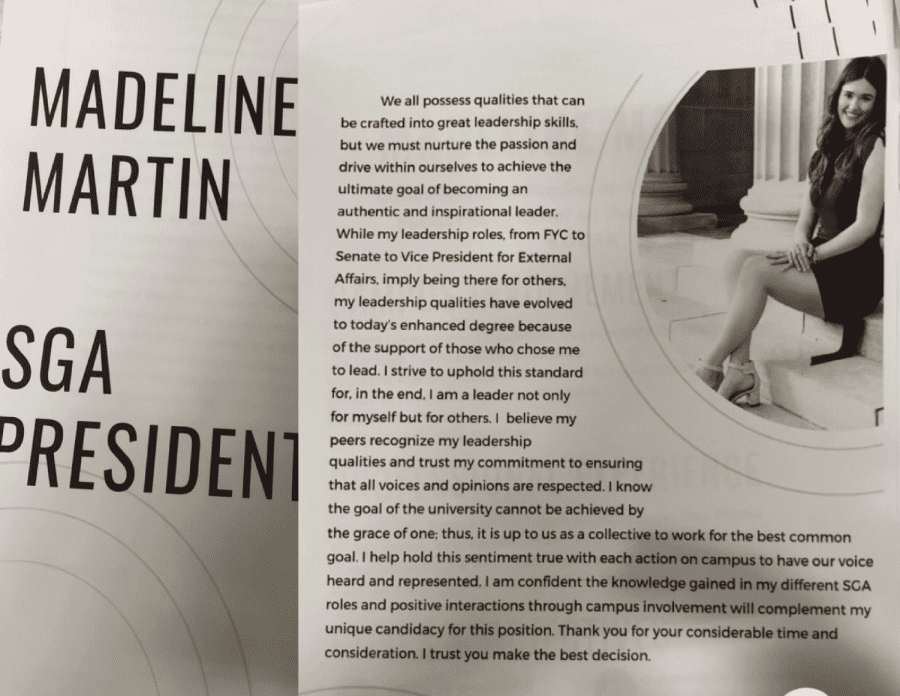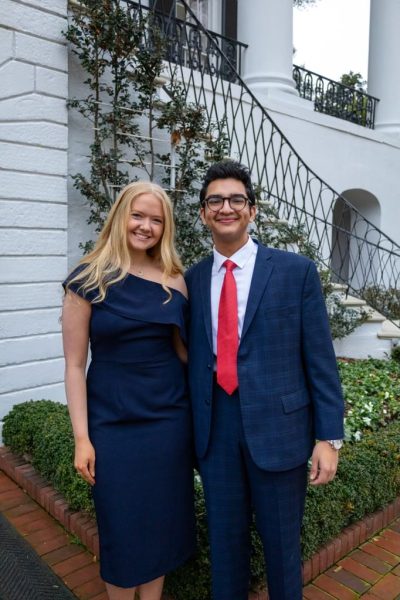SGA Elections Board dismisses complaints against presidential candidates
Presidential candidate Sarah Shield’s campaign team reported opponent Madeline Martin to the Elections Board for overspending on her campaign. The Elections Board dismissed the complaint, but an appeal is underway.
March 7, 2022
The Student Government Association Elections Board dismissed charges against this year’s presidential candidates Sarah Shield’s campaign team reported that Madeline Martin overspent on her campaign.
Shield’s team reported that Martin spent $969.38 on notebooks detailing her platform at the beginning of February after obtaining a receipt of the purchase.
The spending limit for presidential candidates is $750, and the penalty for overspending is a six-point infraction per the Elections Manual. Any candidate who received 12 infraction points can be disqualified.
Martin did not report the notebooks on her financial disclosure forms. On her most recent financial disclosure, Martin reported $468.83 for paint pens, cups and buttons. A candidate’s failure to disclose spending is a nine-point infraction according to the Elections Manual.
In an email to The Crimson White, the Elections Board said there was not sufficient evidence to charge the Martin campaign with exceeding spending limits or campaign ethics violations and “no penalties will be assessed” against Martin’s campaign.
The Elections Board said the manual is ambiguous on purchasing campaign materials before a student begins campaigning. The board recommended that the SGA clarify the ambiguity before the next election cycle.
In response to Shield’s team filing a complaint, Martin’s campaign team reported Shield to the Elections Board alleging that she submitted “premeditated false accusations against another campaign,” which the board also dismissed.
Martin denied that the notebooks were campaign materials.
The Elections Manual defines campaign materials as “any paraphernalia bearing the name, logo, mark, or likeness of a candidate, including but not limited to flyers, literature, pamphlets, buttons, clothing, table tents, advertisements and electronic communication.”
The notebooks were titled “Madeline Martin SGA President” and included details about her campaign platform.
“I purchased these materials in the beginning of February where even the Elections Board Manual was not even published,” Martin said in a statement to The Crimson White.
The Elections Board updates the manual once per term and publishes one month before election day.
“It is my SGA constitutional right to meet with friends, advisors, and/or mentors here at the Capstone to discuss my best path as a UA student, and these are what the materials were used for during my exploratory period as a potential candidate,” Martin said in a statement to The Crimson White. “I have never and will never use the materials during my campaign period.”
During Sunday night’s presidential debate, Shield said she believes Martin purchased the materials with the intent of campaigning, even if Martin placed the order during the preparation period.
Candidates may begin preparation in advance of the established campaign period. The initial, organizational stages of a campaign include selection of a campaign manager, top five and staff.
Campaign preparation also includes any work done outside the public eye to prepare for announcement of candidacy, including forming group messages for members of the campaign team, building social media platforms, and purchasing any campaign materials and photos.
“I’m not sure what you would do with 100 notebooks that isn’t campaigning to people,” Shield said during the debate. “As the only thing you’re allowed to do is talk to your initial campaign team, and that would not be 100 people.”
Shield’s campaign manager Garrett Burnett appealed the Elections Board’s decision to dismiss all complaints against Martin. He submitted an appeal to the Judicial Board on March 6.
Burnett wrote in his appeal that the Martin campaign understood that materials purchased before campaigning began should be disclosed, as evidenced by their reporting cups purchased before the campaign period began on Feb. 28.
“This indicates that the Martin campaign was aware of the campaign expenditure rules regarding disclosing purchases made during the preparation phase of campaigning, but they actively neglected to disclose the purchase of the one hundred spiral-bound books thus violating campaign ethics,” Burnett wrote in the appeal.
If campaign spending limits do not go into effect until after campaigning officially begins, Burnett said the spending limit is unenforceable before the campaign period.
“If this ruling is upheld, there is nothing to prevent candidates from spending as much money as they would like before the official campaigning period begins,” Burnett wrote. “Campaign spending limits exist to level the playing field for all students interested in pursuing student government association positions. Ms. Martin has violated the sanctity of equal opportunity.”
Burnett said the board’s ruling is an example of the Machine’s impact on student government.
“The Elections Board has been infiltrated and corrupted by the Machine,” Burnett wrote in the appeal.











